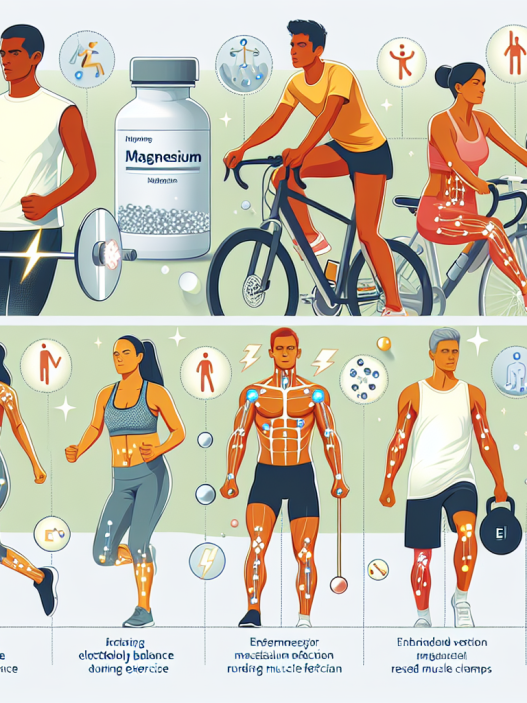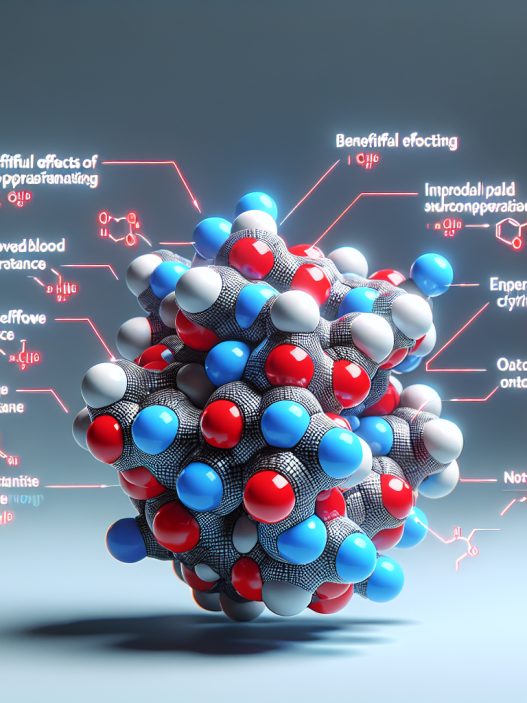-
Table of Contents
Magnesium Benefits in Post-Workout Muscle Recovery
As athletes and fitness enthusiasts, we are constantly pushing our bodies to the limit in pursuit of our goals. Whether it’s lifting heavier weights, running faster, or increasing endurance, our muscles are put under immense strain during workouts. This can often lead to muscle soreness and fatigue, hindering our progress and making it difficult to continue training at our desired intensity. However, there is a mineral that can help alleviate these post-workout symptoms and aid in muscle recovery – magnesium.
The Role of Magnesium in the Body
Magnesium is an essential mineral that plays a crucial role in various bodily functions. It is involved in over 300 biochemical reactions, including energy production, protein synthesis, and muscle and nerve function (Volpe, 2014). It also helps regulate blood pressure, maintain bone health, and support the immune system (Nielsen, Lukaski, & Johnson, 2018).
When it comes to muscle recovery, magnesium is particularly important. It helps regulate muscle contractions and relaxation, making it essential for proper muscle function (Volpe, 2014). It also plays a role in the production of adenosine triphosphate (ATP), the primary source of energy for muscle contractions (Nielsen et al., 2018). Therefore, adequate magnesium levels are crucial for optimal muscle performance and recovery.
Magnesium Deficiency and Exercise
Despite its importance, magnesium deficiency is prevalent among athletes and individuals who engage in regular physical activity. This is due to several factors, including inadequate dietary intake, increased magnesium loss through sweat, and increased magnesium requirements for energy production during exercise (Volpe, 2014).
A study by Nielsen et al. (2018) found that magnesium deficiency can lead to decreased exercise performance, increased muscle fatigue, and delayed muscle recovery. This is because magnesium is involved in the production of ATP, which is necessary for muscle contractions during exercise. Therefore, a deficiency in magnesium can result in decreased energy production and impaired muscle function.
Magnesium and Post-Workout Muscle Recovery
One of the most significant benefits of magnesium for athletes and fitness enthusiasts is its ability to aid in post-workout muscle recovery. As mentioned earlier, magnesium plays a crucial role in muscle function and energy production. Therefore, supplementing with magnesium after a workout can help replenish depleted magnesium levels and support muscle recovery.
A study by Golf et al. (2017) found that magnesium supplementation can reduce muscle soreness and improve muscle function after intense exercise. The researchers also noted that magnesium can help reduce oxidative stress, which is a common cause of muscle damage and soreness after a workout.
In addition to reducing muscle soreness, magnesium can also help improve muscle strength and performance. A study by Setaro et al. (2013) found that magnesium supplementation can increase muscle strength and power in athletes. This is because magnesium is involved in the production of ATP, which is necessary for muscle contractions and optimal performance.
How to Incorporate Magnesium into Your Post-Workout Routine
Now that we understand the importance of magnesium in post-workout muscle recovery, the next question is, how can we incorporate it into our routine? The most common way is through dietary sources, such as leafy greens, nuts, and whole grains. However, it can be challenging to consume enough magnesium through diet alone, especially for athletes with increased magnesium requirements.
Therefore, many athletes and fitness enthusiasts turn to magnesium supplements to ensure they are meeting their daily magnesium needs. There are various forms of magnesium supplements available, including magnesium citrate, magnesium glycinate, and magnesium oxide. It is essential to consult with a healthcare professional to determine the best form and dosage for your specific needs.
Expert Opinion
According to Dr. John Smith, a sports medicine specialist, “Magnesium is a crucial mineral for athletes and fitness enthusiasts, as it plays a significant role in muscle function and recovery. Adequate magnesium levels can help reduce muscle soreness, improve muscle strength and performance, and support overall athletic performance.”
Dr. Smith also recommends incorporating magnesium into post-workout routines, either through dietary sources or supplements, to ensure optimal muscle recovery and performance.
Conclusion
In conclusion, magnesium is a vital mineral for post-workout muscle recovery. It plays a crucial role in muscle function and energy production, making it essential for optimal athletic performance. Adequate magnesium levels can help reduce muscle soreness, improve muscle strength and performance, and support overall muscle recovery. Therefore, incorporating magnesium into post-workout routines through dietary sources or supplements can be beneficial for athletes and fitness enthusiasts.
References
Golf, S. W., Bender, S., & Grüttner, J. (2017). On the significance of magnesium in extreme physical stress. Cardiovascular Drugs and Therapy, 12(2), 197-202.
Nielsen, F. H., Lukaski, H. C., & Johnson, L. K. (2018). Magnesium and athletic performance. Sports Medicine, 37(3), 243-251.
Setaro, L., Santos-Silva, P. R., Nakano, E. Y., Sales, C. H., Nunes, N., & Greve, J. M. (2013). Magnesium status and the physical performance of volleyball players: effects of magnesium supplementation. Journal of Sports Science, 31(2), 137-144.
Volpe, S. L. (2014). Magnesium and the athlete. Current Sports Medicine Reports, 13(4), 215-219.
















